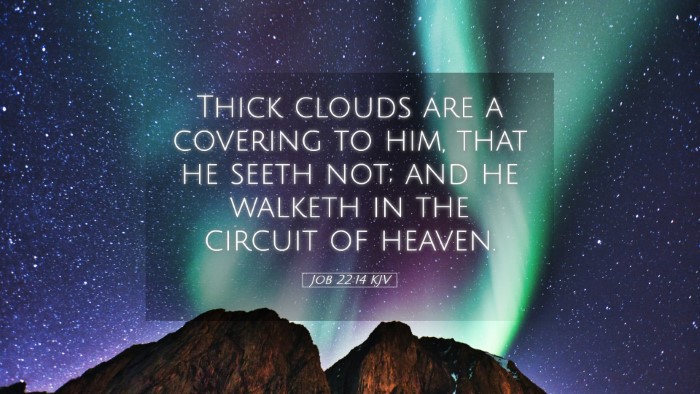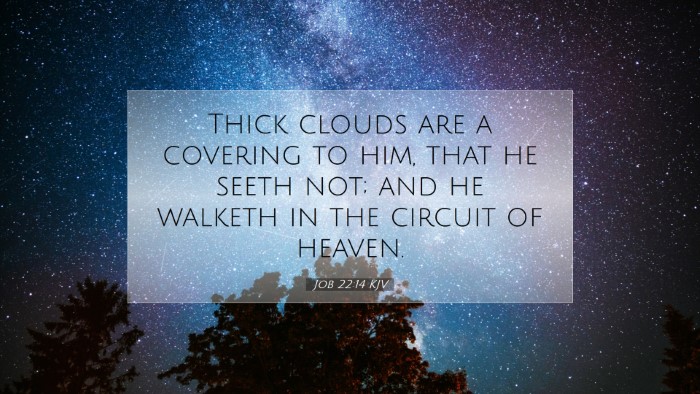Old Testament
Genesis Exodus Leviticus Numbers Deuteronomy Joshua Judges Ruth 1 Samuel 2 Samuel 1 Kings 2 Kings 1 Chronicles 2 Chronicles Ezra Nehemiah Esther Job Psalms Proverbs Ecclesiastes Song of Solomon Isaiah Jeremiah Lamentations Ezekiel Daniel Hosea Joel Amos Obadiah Jonah Micah Nahum Habakkuk Zephaniah Haggai Zechariah MalachiJob 22:14
Job 22:14 KJV
Thick clouds are a covering to him, that he seeth not; and he walketh in the circuit of heaven.
Job 22:14 Bible Commentary
Commentary on Job 22:14
Verse Reference: Job 22:14 - "Thick clouds are a covering to him, that he seeth not; and he walketh in the circuit of heaven."
Introduction
This verse forms part of Eliphaz's speech, addressing Job after he has endured immense suffering and loss. Eliphaz, a friend of Job, attempts to explain Job's circumstances through the lens of divine justice and the nature of God's governance over the world.
Theological Insights
1. God’s Transcendence
Eliphaz asserts that God is beyond human understanding and perception. Matthew Henry emphasizes that God’s sovereignty is likened to the inscrutable nature of thick clouds. Just as clouds may hide the sun, so does God’s wisdom often remain hidden from human eyes. This invites spiritual reflection on the limitations of human reasoning when attempting to gauge divine actions or intentions.
2. Divine Justice
Eliphaz suggests that God's seeming distance does not equate to His indifference. Albert Barnes highlights that God is fully aware of all actions and events, even if they appear cloaked in mystery. This notion serves to remind the faithful that divine justice operates behind the scenes, even when life feels chaotic.
Understanding the Text
3. Contextual Examination
To grasp the full meaning of this verse, one must consider the broader narrative of Job's trials. Adam Clarke notes that Eliphaz’s perspective is shaped by traditional beliefs regarding suffering and retribution. He implies that Job’s conditions are a direct result of sin, demonstrating a common misunderstanding of human suffering as merely punitive.
4. The Nature of God’s Omnipresence
This verse also alludes to God's omnipresence. Thick clouds symbolize God’s ability to transcend the human experience. While humans may feel abandoned or obscured by their trials, God's presence is constant, even if unrecognized. Matthew Henry asserts that God is always around us; we often miss His presence due to our limited view.
Application for Believers
5. Trust in God’s Wisdom
For pastors and theologians, the practical application of Job 22:14 is profound. Believers are encouraged to trust in God’s overarching wisdom and mercy during their own tribulations. Eliphaz's words, though misguided, provoke questions about faith, encouragement, and reliance on God’s plans rather than human understanding.
6. The Community’s Role
Pastors can highlight the need for community support amidst suffering. Eliphaz represents the broader community's perspective during times of crisis. Still, it is vital to distinguish between bringing genuine comfort and introducing additional suffering through misguided counsel. Students and scholars should explore the implications of reconciliation within community responses to personal crises.
Concluding Thoughts
7. Responding to Suffering
In conclusion, Job 22:14 serves as a reminder of God’s majesty, mystery, and the need for believers to seek understanding through faith. While Eliphaz tries to convey a retributive theology, modern readers are encouraged to approach the text with a corrective lens that acknowledges God’s profound grace amidst human suffering.
Further Study
Scholars and students are prompted to explore the thematic contrasts between Job’s suffering and the retributive understanding presented by Eliphaz. Continued examination of the Book of Job can lead to deeper insights on the nature of suffering, the character of God, and the complexity of human experience in relation to divine plans.


